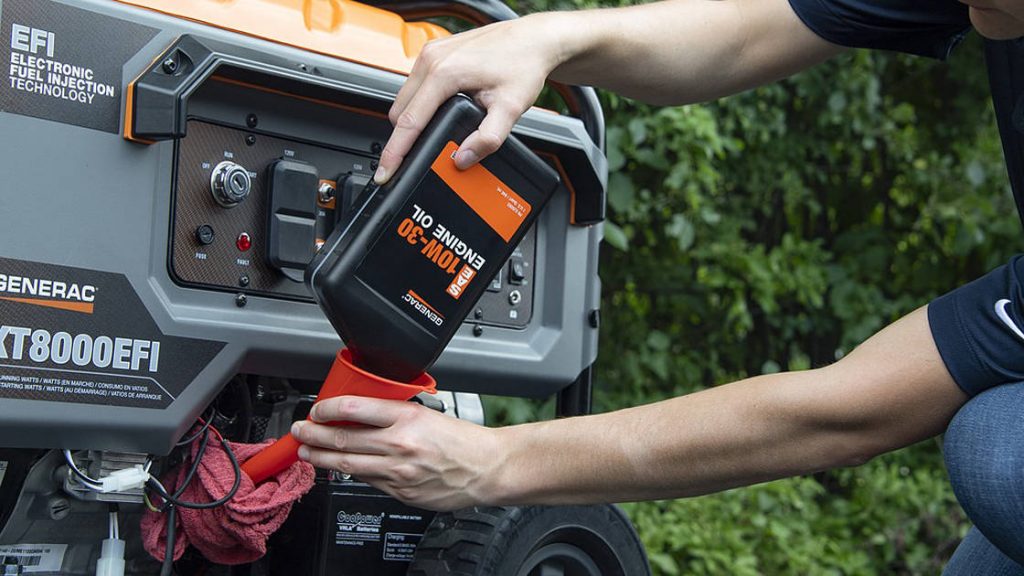Introduction
Are you looking at how to maintain generators? In order to ensure your generator is always ready to go, it’s important that you take the time every few months or so to do a little bit of maintenance. This will keep your generator running for as long as possible and save you from having any kind of breakdowns when you need it most.
Portable generators can also pose safety risks if they are not properly maintained or used. To ensure that you get the most use out of your portable generator, it is important to conduct routine maintenance and follow certain guidelines when using them.
This article will help you better understand how you can maintain your generator at home with simple steps.
Related:
- Inverter Generator Vs Generator – Which Type Should You Buy?
- What is an inverter generator?
- How to reduce generator fuel consumption?
How to maintain generators
Generators are excellent pieces of equipment, but they require some care and attention if they’re going to work properly over time. Some of the most common issues with generators arise from improper use or lack of maintenance. If you want your generator to last as long as possible, read on for our recommendations!
1. Keep it dry
Water is a generator’s enemy, just like rust and corrosion. Make sure that your generator is stored somewhere that’s relatively free from moisture and isn’t subject to high humidity conditions (like living in a basement). Besides, when the generator is operating in wet conditions, there is a risk of short-circuiting the electrical system or you can get a very dangerous electric shock.
You can further protect it against moisture by using protective oil or covering it up when not in use; although don’t use plastic covers as those may trap heat inside and cause condensation problems.
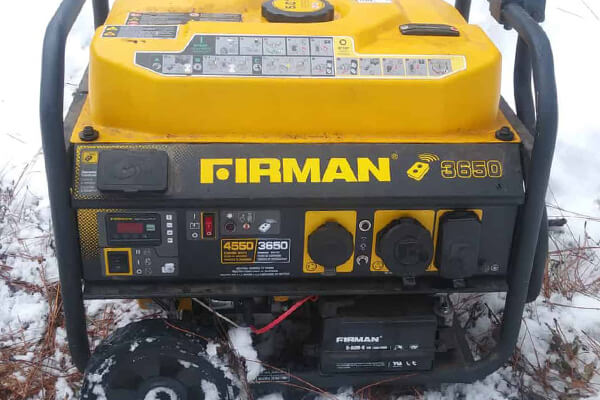
Do not leave the generator in a wet location
2. Don’t run out of gas
This is not recommended, the generator running like that risks damaging the engine. The carburetor will dry out inside if you run the generator with no fuel in it, which can cause costly repair problems.
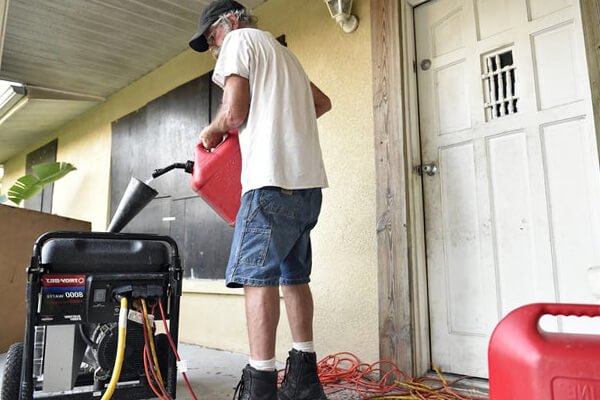
Do not let the generator run when it runs out of gas
3. Keep it lubricated
Just like with cars, keeping your generator properly lubricated keeps things running smoothly and prevents wear and tear on moving parts. Check every oiling point for leaks or drips at regular intervals. Change the oil after every 25 hours of running time to prolong engine life. Make sure to replace oil once a year, or more frequently if you use your generator regularly.
You should also run the generator a few times a month for about 25 minutes to keep the electric starter battery fresh and charged. This makes the generator easy to start up and in top working order.
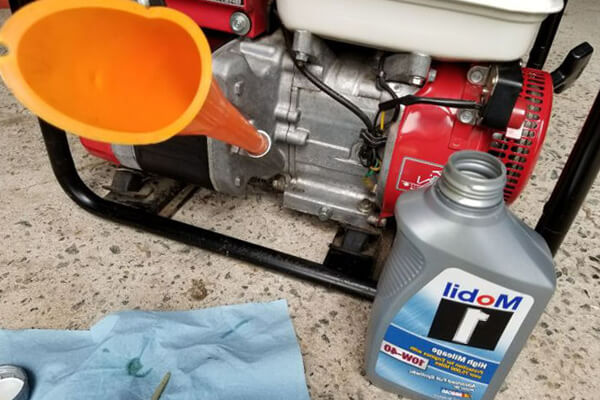
Change generator oil
4. Use the proper fuel
Using the wrong kind of gasoline in your generator is a surefire way to damage it. Make sure you use clear gas with no ethanol content at all (ethanol will destroy rubber seals and gaskets over time). If you don’t know what’s in your gasoline, check with your supplier or follow these steps.
5. Use premium fuel
You’ll get better performance and more power out of your generator if you purchase high-octane fuel for it. Using low octane gas can even damage the engine over time, so make sure to purchase only the highest quality products.
Buy high-quality oil helps keep your generator running smoothly and prevents issues like engine overheating and even small engine fires. Premium lubricants can minimize friction and prevent unnecessary wear on moving parts.
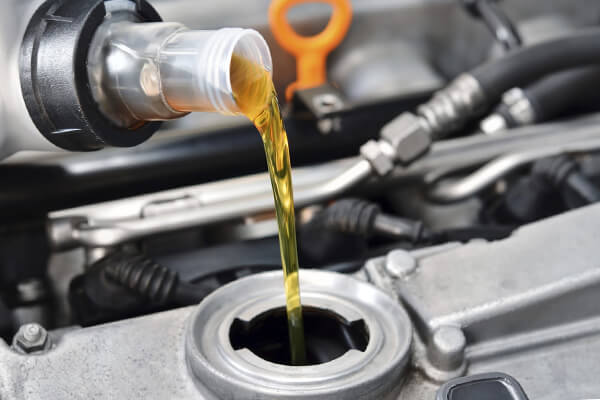
Use high-quality fuel for generators
6. Keep an eye on fuel levels
Ideally, you should keep at least 1/2 tank of gasoline in your generator at all times to prevent damaging the engine. Don’t fret if you can’t keep up with this (it’s hard to know how much fuel you use), just make sure to fill your generator before it runs out of gas.
7. Inspect before use
Before you use your generator, do a quick inspection to make sure everything’s working properly. Look for leaks of any kind (oil, gas, or water), frayed wires, faulty switches or plugs, etc. It’s easier to fix these problems on the ground than it is after they’ve caused more significant damage!
8. Preventative replacement
It’s also a good idea to have some key wear-and-tear parts replaced before they break: fuel filters (to make sure you don’t lose power because of cloudy fuel), spark plugs (which should be checked regularly to avoid dirt – Replace spark plugs after 100 hours or when they are noticeably worn down), and air filter (to make sure that dirt and dust don’t build up in the engine).
Check all wiring for loose connections and fraying, etc. If you do these kinds of tasks regularly, there’s less chance that something will go wrong during an emergency!
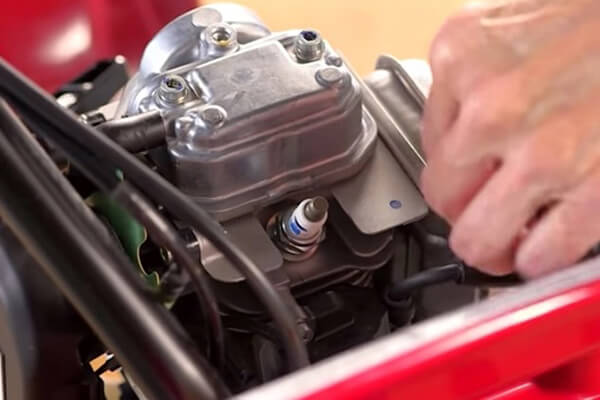
Replace spark plugs for generators
9. Use a power cord designed for generators
Using a heavy-duty extension cord that isn’t designed for use by a generator may overload the circuit breaker, resulting in damage to the generator. It’s important to use a power cord that was made specifically for generators (and has the correct amperage).
10. Watch for issues
When using your generator, be on the lookout for smoke coming from the exhaust or any other warning signs that something is wrong. If you see anything like this, stop running right away and consult a professional about how best to repair the problem.
11. Maintain the exterior
At the end of every run, give your generator a thorough cleaning outside with a gentle detergent and a soft brush. If there are any dents or signs of rust, you can remove them by using an automotive-style metal polish. Don’t use anything abrasive on the surface of your generator as it may damage the paint.
12. Store safely
If you’re not planning on using your generator for an extended period of time, store it in a dry location where you can monitor its condition. Ideally, take it to a storage center or other professional who specializes in keeping generators safe and maintained.
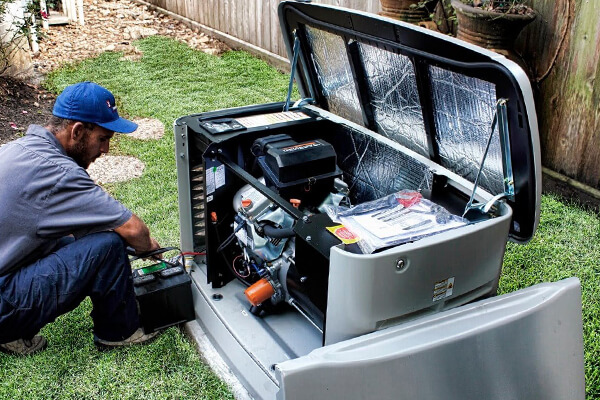
Safe storage of generators
Conclusion
Generators, like cars, need regular maintenance to keep them running smoothly and extending their life! Don’t make the mistake of thinking that since generators can run continuously and they don’t need any care. The exact opposite is your generator needs a little love and attention every now and then in order to function properly over time! So how to maintain the generator? By following these generator maintenance tips, you can enjoy years of excellent use from your machine. However, when you are unsure of how to perform some of these checks and repairs, contact a professional service center near you or specialists for the best assistance.
If this article was helpful, make sure to share it with others. It’s great knowledge to share and know we helped someone with their generator maintenance needs! Thanks for reading!
Further Reading:
